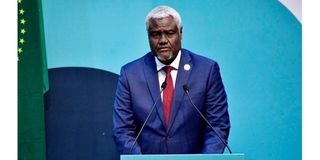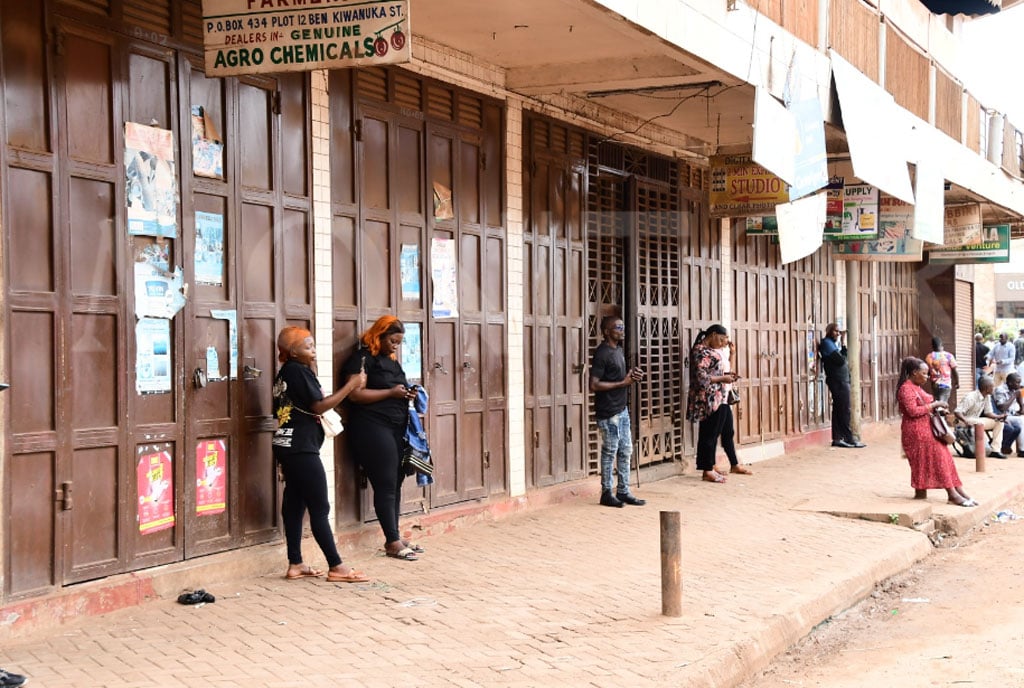AU faced with old crises as leaders plot to polish scorecard, roadmap

African Union (AU) Commissioner Moussa Faki makes his remarks during the Africa Climate Summit held at the Kenyatta International Conference Center (KICC) in Nairobi, Kenya on September 5, 2023. PHOTO | FRANCIS NDERITU | NMG
What you need to know:
- It is gathering as conflict rages in Sudan where factions of security forces have been fighting since April last year, and the violence in Eastern DR Congo has resumed.
Leaders of the African Union (AU) are gathering in Addis Ababa, Ethiopia taking on new challenges, even as they face old problems. The 37th Ordinary Session of the African Union Assembly, the topmost meeting of the continental body is gathering under the theme of “Education, science, technology and innovation,” seeing itself as a ripe region to compete with the bigger players round the globe.
And the agenda, according to a tentative programme shared this week, includes reforming the AU as an organisation, intercontinental cooperation, trade, gender and all issues under education and science including the battle against climate change and how to finance it.
And although leaders are also expected to pore over the African Union (AU) Peace Fund and the Africa Continental Free Trade Area (AfCFTA) agreement, the programme left out mentioning particular crises by name, reflecting the sensitivity attached to these issues.
The continental body is gathering as conflict and violence rages in Ethiopia itself, where a local human rights body claimed as many as 65 civilians were killed by extrajudicial means in Amhara region and millions facing starvation in Tigray region.
It is gathering as conflict rages in Sudan where factions of security forces have been fighting since April last year, and the violence in Eastern DR Congo has resumed.
Like Sudan, Niger, Mali, Gabon and Burkina Faso remain suspended for committing coups on their territories; the highest number of suspended countries for coups at a particular time this century.
Ahead of Saturday Summit, the International Crisis Group (ICG), the Nairobi-based think-tank that watches over hot issues around the world, said the AU must not drop the ball on eight key issues foremost of which is how to better deal with the “democratic backsliding” seen across the continent.
The ICG suggested leaders must also focus on Sudan, where the search for ceasefire has failed numerous times, preserve Ethiopia’s stability in the face of a new wave of militia groups, avert tensions between Rwanda and the DRC who blame each other for the war in Eastern Congo and reinvigorate diplomacy in the Sahel region, now colloquially known as the ‘coup belt’.
Other ‘forgotten’ issues include Cameroon’s conflict in Anglophone region, the Somali transition and South Sudan’s journey to its first ever General Election.
“With violence escalating in many parts of Africa and the risk of inter-state war growing, this year’s AU summit presents a critical opportunity for member states to tackle the many challenges facing the continent,” said Murithi Mutiga, Programme Director for Africa at ICG.
Chairman’s take
“While financial and political constraints have limited the AU’s ability to meet its commitments to mediation and peacekeeping, the body still plays an important role in advancing African perspectives in global debates and addressing obstacles to continental peace and security. Member states should use the moment to lay out a roadmap for the year ahead and shore up the body’s capacity to act effectively for peace.”
While the programme omitted the active conflicts, leaders at the AU already admit they can’t be ignored. At the opening session for the Executive Council of Ministers of Foreign Affairs, African Union Commission Chairperson Moussa Faki Mahamat pointed at the resurgence of military coups, pre- and post-election violence, humanitarian crises linked to war and the effects of climate change as old challenges the AU should address.
“They pose a serious threat to tarnish the signs of the emergence of the Africa of which we are proud,” he told the audience on Thursday.
“At a time when all these tragedies are killing in large numbers and throwing thousands of people into precariousness and misery.
Another new phenomenon of collapse of our institutions of regional and continental governance is taking place, one that is affecting almost all regional economic communities (RECs).”
Faki’s home country is among countries that have committed coups while he served as AUC Chair, even though Chad was not initially suspended from AU Activities like its peers. Chad, nonetheless offers, then postponed its election plan by two years.
The AU had hoped to move on though. This year, it plans to launch the Special Project on Agenda 2063, marking the second decade under its Vision of Agenda 2063. Those old challenges, Faki admitted, curtailed the first decade of the Vision launched in 2013, suggesting some of the goals like Silencing the Guns, were never met.
Nonetheless, he helped AU join the G20 the grouping of the world’s richest economies, hoping to use its resources to better.
“Africa cannot afford to play small in this 4th industrial revolution. We must be drivers or miss yet another opportunity. We can build technological capabilities that foster value addition in strategic sectors like agribusiness, manufacturing, green transitions, global health etc. We can generate economies of scale and agglomeration because we have the necessary workforce,” Faki said.
“Our membership at the G20, for which we made intense advocacy, imposes on us more rationality, method and constant vigilance in the turbulent sphere of international relations of the moment.”
The AU’s failings, some experts argued on Friday, are also related to the way it communicates about crises.
Liesl Louw-Vaudran, Senior Adviser on the African Union at ICG said diplomacy is a better tool to nurture for the continental body to address the current crises but added: “The AU should also keep channels of communication open with countries in the Sahel and put Cameroon’s Anglophone conflict on the agenda.”
The continental leaders though have chosen to see the glass as half full. Dhoihir Dhoulkamal, the Comoros Minister for Foreign Affairs and International Cooperation, and Chair of the Executive Council, admitted, too, that terrorism, violent extremism, and unconstitutional changes of government have combined to hurt the democratic processes on the continent. But he argued there has been positive movement.
“We have also spared no effort to find a lasting solution to the various crises that are currently affecting the continent. In Cairo, Addis Ababa and Djibouti, the war in Sudan has mobilised energies to bring the positions of the warring parties closer together,” he said on Thursday in Addis Ababa.
Political transitions
“In the Sahel, political transitions in Mali, Niger and Burkina Faso appear to be stalling. The withdrawal of these three countries from the regional bloc is not likely to promote a rapid return to institutional normalisation. It is up to Economic Community of West African States (Ecowas) to enter into frank and sincere discussions with its three member states as soon as possible in order to find a way out of this situation, which is harmful to both parties, quickly and up.”
In spite of criticism, the AU sees its efforts in ending the conflict in Tigray region as one its recent successes. It drew praise from the Ethiopian government.
Taye Atske-Selassie, Ethiopia’s new Minister of Foreign Affairs said: “The AU Peace and Security Architecture is central to the success of the African solutions to African challenges."
“The Pretoria Peace Agreement that ended the conflict in Northern Ethiopia shows our commitment to African solutions and the African Union’s ability to deliver peace.”




